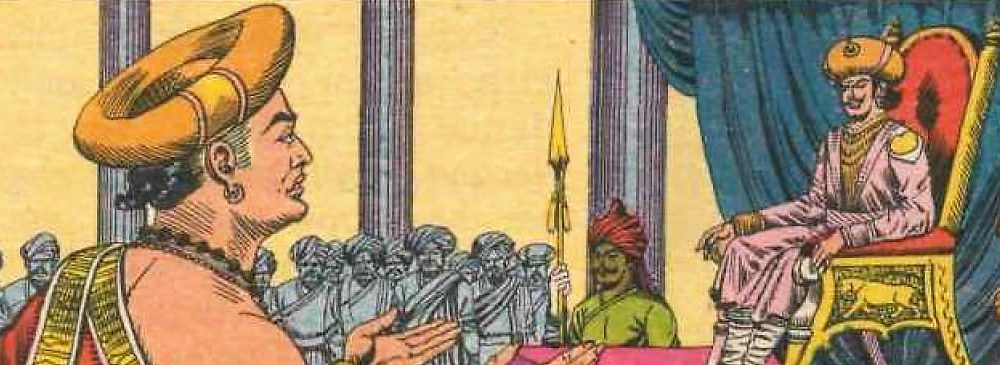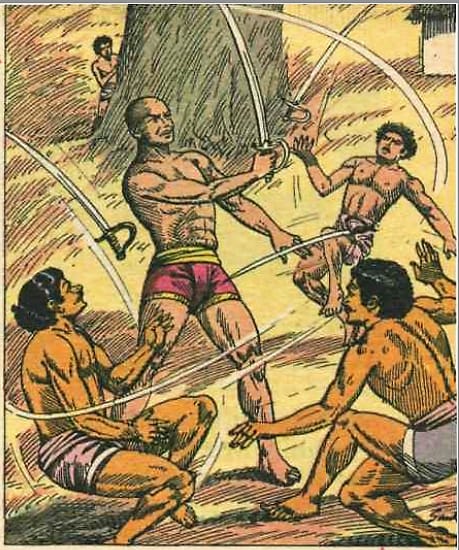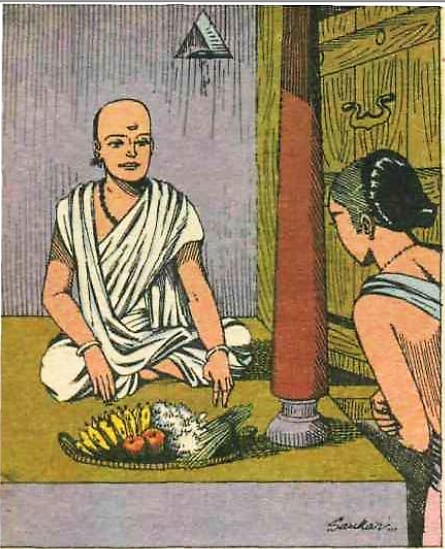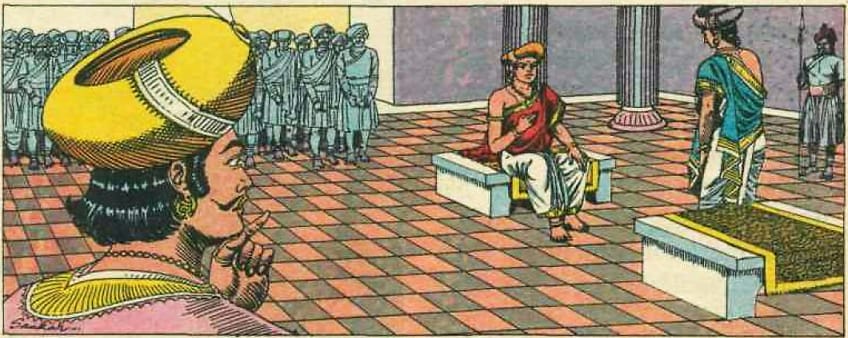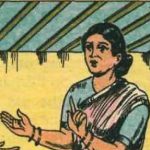The king of Chandragiri was on his deathbed. He was leaving behind him no immediate heir to succeed to the throne. He called his ministers and important courtiers to his bedside and said, “I want that someone capable of protecting the kingdom should be chosen to ascend the throne. I suggest that you hold a contest among the young men of the kingdom in all the martial arts. Let the one who proves to be the best become the king.”
The king died soon after imparting this bit of advice. After his funeral was over, the ministers organized the contests in a systematic manner. The one to emerge most successful in every item was Jaidas. He now assumed the name Jayendra Bahadur Verma and ascended the throne.
The royal court of Chandragiri had a famous scholar named Pandit Pundarik Sharma. As the new king took a seat in the court, he stood up and recited a verse composed in his honour. In the verse, King Jayendra had been compared to Arjuna for his valour and to Harishchandra for his truthfulness.
Suddenly the young king laughed. Sharma stopped and asked, “My lord, did I say anything awkward that you laughed?”
“Tell me, Sharma, how did you become the court scholar?” asked the new king.
“I was born in a family of scholars and poets. My grandfather was a member of the court of King Aditya of Visalpur. My father was a poet who taught poetics at Varanasi. I studied under a great scholar, Vishweshwar Trivedi of Puri, for ten years. A letter from him to the former king got me this post,” said Sharma.
The new king laughed. Then he said, “Ten years of study at Puri and many years of preparation prior to that made you the court scholar. Only three years of practice in the martial art made me the king. Is it not amusing that you should compare me to Arjuna and Harishchandra? Are such comparisons not lies?”
Sharma became grave. He then said, “My lord, it is a custom to welcome a new king with such verses. There are two reasons for such comparisons. First, a new king gets confidence from these verses. Second, it tells a wise king what we the people expect of him. My lord, chance can make one a king, but chance cannot make one a scholar. One has to study knowledge of philosophy, scriptures and other such subjects.”
It was clear that the courtiers and all the noblemen present in the court appreciated Sharma’s arguments. That annoyed the new king. He burst out, saying, “Do you mean to say that a scholar is greater than a king?”
“My lord, as a man a king may be greater than a scholar and a scholar may be greater than a king. But scholarship is greater than kingship! I had to say this because you put the question point blank to me. It is said that a king is honoured only within his kingdom, but a scholar is honoured everywhere!”
“Enough!” shouted the king. “You must prove that a scholar is greater than a king, within a month. Otherwise, you must leave Chandragiri to find honour elsewhere!”
Sharma was going to say something more.. But the king waved impatiently and said, “I further. You need not attend
the court until you have proved what you said!”
Sharma left the court. An uneasy silence prevailed in the atmosphere for some time. Then other businesses of the day began.
Three weeks passed. One day there was a scholar from the court of Vikrampur. He had been accompanied by a minister of Vikrampur The minister had brought a message from his king: It said that if any scholar belonging to the court of Chandragiri could defeat the scholar from Vikrampur, then the king of Vikrampur would give away fifty villages to Chandragiri. If no scholar of Chandragiri can defeat the scholar from Vikrampur, then Chandragiri must become a vassal state of Vikrampur. There will be war if King Jayendra does not agree to this proposal!
The new king saw dark. Vikrampur was a powerful kingdom and its king was a whimsical man. King Jayendra asked the junior court scholars to argue with the visiting scholar. They tried their best but failed miserably.
King Jayendra sat depressed. His prime minister met him and said, “My lord, we are facing a crisis. This is no time to stand on any false prestige. You must invite Pundarik Sharma to take up the challenge.”
The king sent for Sharma. He came and faced the visiting scholar, boldly.
In the argument that followed, the visiting scholar admitted defeat. But Sharma said, “My friend, the question of victory and defeat is irrelevant in scholarly discussion. We have different points of view. That is all. Your admitting defeat only proves the noble trait of humility in you.”
This moved the visiting scholar so deeply that he embraced Sharma.
After the visiting scholar’s departure, King Jayendra descended from his throne, touched Sharma’s feet and apologized to him. “You have proved that a scholar is greater than a king,” he said.
“My lord, it is only by chance that I proved it. Had the scholar from Vikrampur not arrived, I would have silently left your kingdom after the period of a month, That is why, my request to you is to be patient and never to announce a decision in haste particularly when the decision is harmful to somebody,” said Sharma.
“I realize it,” said the young king.

